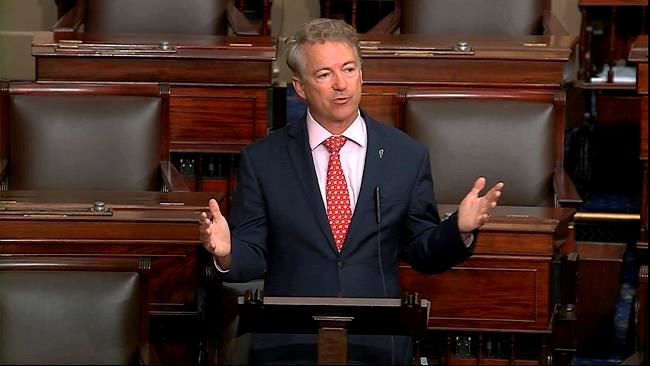WASHINGTON — Sen. Rand Paul, R-Ky., said Sunday that he had tested positive for the disease caused by the new coronavirus, becoming the first member of the Senate to report a case of COVID-19. He said in a tweet that he was feeling fine and was in quarantine.
Paul, an eye surgeon, said he has not had symptoms and was tested out of an abundance of caution due to his extensive travel and events. He said he was not aware of any direct contact with any infected person.
Paul, a deficit hawk, was among eight Senate Republicans who voted against a House-passed bill last week that provided more than $100 billion to boost testing for the coronavirus and guarantee paid sick leave for millions of workers. He also was only Republican senator who opposed an earlier bill authorizing $8.3 billion for initial response to the coronavirus.
The senator was on Capitol Hill this past week, including at a luncheon Friday among GOP senators. He spoke on the Senate floor on Wednesday afternoon, addressing the cornonavirus and an amendment he sponsored that would pay for virus relief efforts by withdrawing U.S. forces from Afghanistan.
A spokesman for Sen. Jerry Moran, R-Kan., said Moran briefly saw Paul at the Senate gym Sunday morning and that he shared that information with GOP colleagues at a policy meeting. Moran “followed CDC guidelines and kept a safe distance between him and Sen. Paul,'' spokesman Tom Brandt said. Moran has spoken with the attending physician at the Capitol and has been told he does not need to self-quarantine, Brandt said.
South Dakota Sen. John Thune, the second-ranking Republican senator, said on the Senate floor that lawmakers will consult with the attending physician about all senators who have been in contact with Paul.
Sen. Mitt Romney, R-Utah, said he was praying for Paul and noted that Paul's health is compromised. Paul, 57, broke several ribs in 2017 when a
Two House members, Reps. Mario Diaz Balart, R-Fla., and Ben McAdams, D-Utah,, have tested positive.
The Senate was in session Sunday seeking a bipartisan response to the pandemic. If approved, the bill would be the third measure Congress has approved in response to the coronavirus this month.
The White House has increasingly emphasized that testing should prioritize the elderly and health care workers who have symptoms of the virus. While most cases of COVID-19 are mild and tens of thousands of people have recovered, older people and those with underlying health problems are at higher risk for more serious problems, such as pneumonia.
“We don’t want everyone to go out and get a test because there’s no reason for it," President Donald Trump told reporters in a briefing Friday.
The Centers for Disease Control and Prevention tells people to seek testing if they have certain symptoms of the flu-like illness caused by the coronavirus – fever, cough and trouble breathing – and if they have
The vast majority of people recover from the new virus. According to the World Health Organization, people with mild illness recover in about two weeks, while those with more severe illness may take three to six weeks to recover.
___
Associated Press writers Lisa Mascaro and Mary Clare Jalonick contributed to this report.
___
The Associated Press receives support for health and science coverage from the Howard Hughes Medical Institute’s Department of Science Education. The AP is solely responsible for all content.
Matthew Daly, The Associated Press



